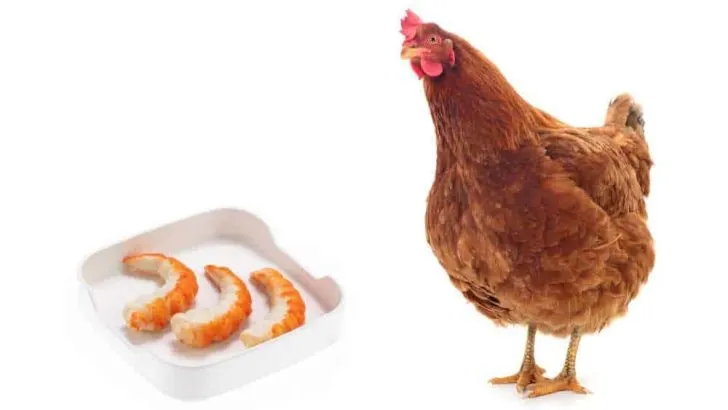Chickens are known for loving to pick on anything they lay their eyes on. These omnivores can eat seeds, insects, and even small animals like mice or little snakes. However, those foods can usually be found in their natural habitat.
On the other hand, the sea isn’t really a natural place for chickens to live and find food in. As a responsible chicken owner, you’re probably wondering if some seafood is okay for your chick. All this raises the question: can chickens eat shrimp?
Well, no worries! In this article, we’re covering all you need to know about shrimp consumption in chickens. Whether you’re wondering if chickens can eat shrimp shells or shrimp tails, this is the article for you! Read along to find out more.
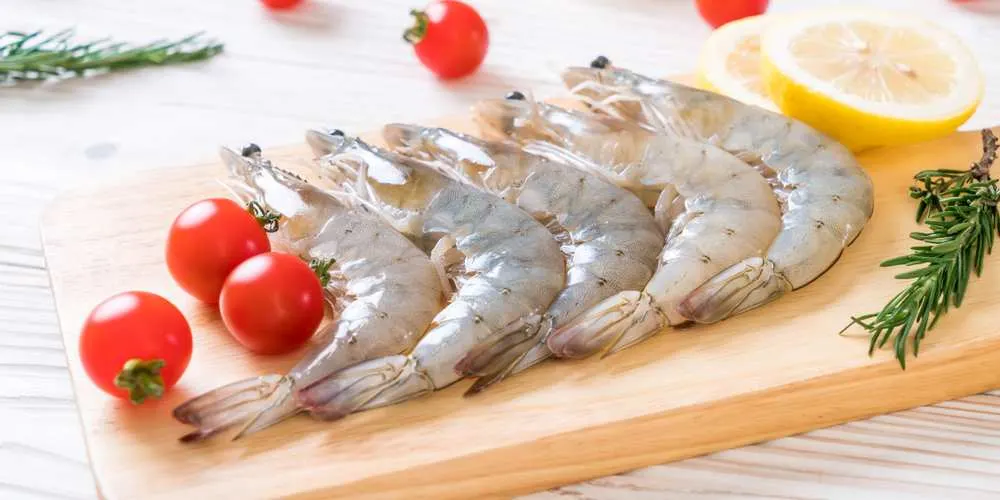
Can Chickens Eat Shrimp?
To shorten the uncertainty: chickens can eat shrimp! Most seafood is entirely okay for bird consumption. Before we dive into details, let’s cover the primary information about shrimps.
There are numerous ways to prepare them. Whether they’re dried, cooked in the oven, or simply fried – they’re a delicious dish filled with omega 3. However, when concerning your chicken, the taste isn’t that important. Chickens have just around 300 taste buds!
This is why chickens aren’t that picky eaters. We humans, on the other hand, have around 10.000 taste buds. Still, flocks enjoy picking on different textures, especially while free-ranging. That’s why shrimps can be an excellent way to surprise your hens from time to time.
Can Chickens Eat Shrimp Shells?
While preparing shrimps, humans usually get rid of the shells. So, it’s fair to ask: can chickens eat shrimp shells?
Most certainly, they can! Sometimes, what seems to be trash for us, can be very beneficial for our pets! The shells of shrimps contain high amounts of calcium. You know the drill: the more the calcium, the better the eggs! You can crush up some leftover shells and mix them with your chick’s regular meal.
However, you should be cautious. Sharp bits of the shell can hurt your flock’s intestines. This is why you should crush them to very tiny pieces, almost to a powdery consistency. Besides that, never give your pet chicken parts of raw shrimps that have gone bad.
Can Chickens Eat Shrimp Tails?
What about the tails? Can chickens eat shrimp tails? No worries, we didn’t forget about the shrimp tails.
Yes, the bottoms are also entirely safe for flock consumption. All shrimp parts are safe for chickens! It’s just essential that you never give your feathery friend moldy or rotten shrimp parts.
Can Chickens Eat Prawns?
Although shrimps are often confused with prawns, they’re definitely not the same animal. Prawns and shrimps are closely related. However, they differ in nutrition and size. Just like shrimps, prawns are entirely safe for chicken consumption!
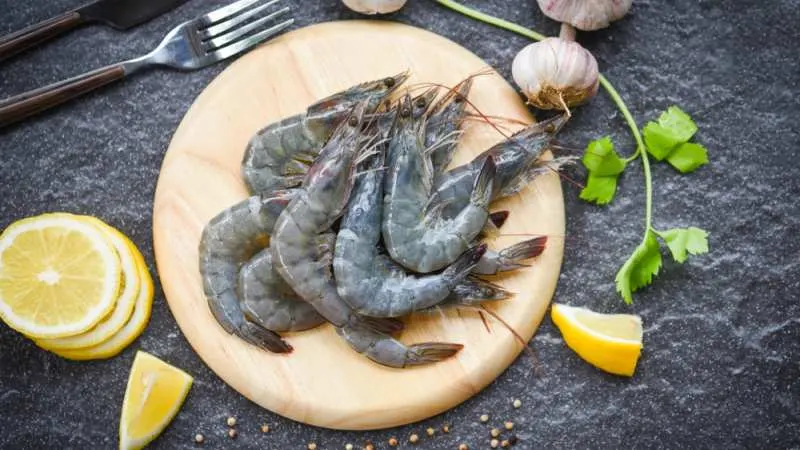
Nutritional Value
We have crossed the main things about shrimp consumption in chickens! Now it’s time to look at the nutritional profile of shrimps.
Here’s the nutritional value of an 85 gram serving of shrimp.
| Calories | 84 |
| Protein | 18 grams |
| Selenium | 48% of the RDI |
| Vitamin B12 | 21% of the RDI |
| Iron | 15% of the RDI |
| Phosphorus | 12% of the RDI |
| Niacin | 11% of the RDI |
| Zinc | 9% of the RDI |
As you can see – shrimp has an impressive nutritional profile! It doesn’t contain any carbs, plus it’s pretty low in calories! Around 90% of calories in shrimp come from protein, and the other 10 are from fat.
However, there’s another side to this coin. Shrimp has a bad reputation because it’s high in cholesterol. Besides that, no matter how great these benefits look – shrimps are still only treats to chickens.
Just like any pet, chickens require a healthy, balanced diet. Shrimps and other human foods shouldn’t be given often to your pet chicken. 90% of your chicken’s diet should mainly consist of quality poultry feed. Only the remaining 10% should be for treats and other foods.
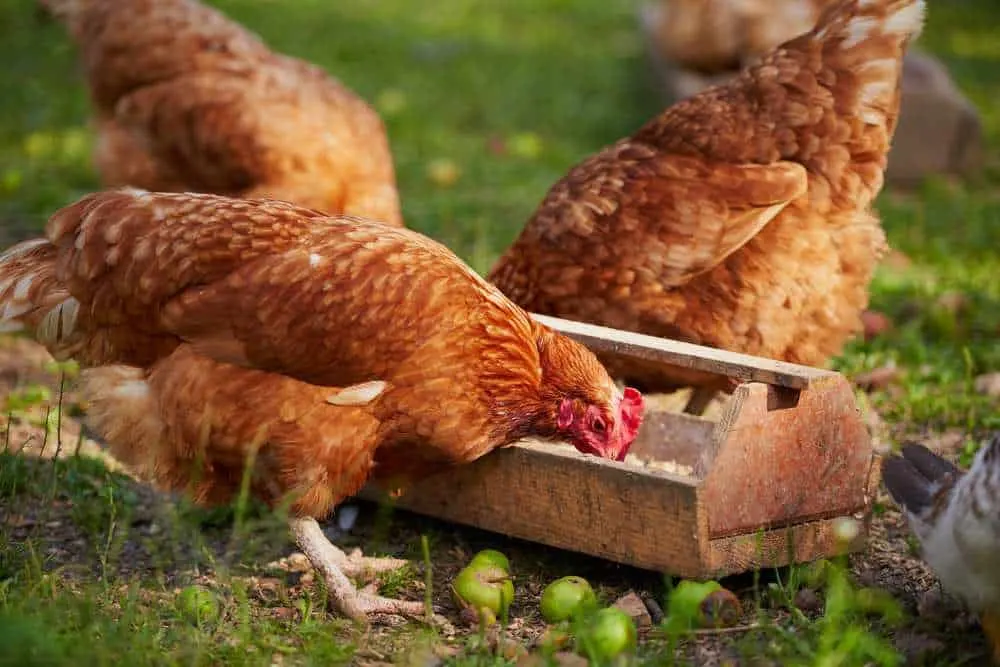
Health Benefits and Potential Risks
The impressive nutritional profile of shrimps comes with loads of benefits for your feathery friend! The mentioned serving size provides your chicken with more than 20 different vitamins and minerals.
For starters, shrimps are very high in selenium. This mineral can help reduce inflammation and promote a healthy heart! Next to selenium, shrimps are high in iodine. It’s one of the best food sources for it! Iodine is excellent for brain functioning.
Besides iodine and selenium, shrimps are a great source of omega 6 and omega 3 fatty acids. These have been proven to benefit chicken egg production!
Antioxidants are also present in shrimps. The primary type in shrimps is a carotenoid named astaxanthin. This antioxidant is a part of algae, which shrimps consume. Astaxanthin protects against inflammation and may help with healthy arteries.
What about the risks?
Just like we mentioned above, the high cholesterol content is the main problem with shrimps. However, when given in moderation, shrimps can’t harm your flock. This is why it’s essential to follow a balanced diet for your feathery friend.
While shrimps don’t have any more significant adverse effects on chickens, they can affect their eggs. Fish or seafood wouldn’t be a part of a chicken’s natural diet in the wild. Too much seafood can lead to a weird taste of eggs. It’s best to keep the fishy stuff in moderation!
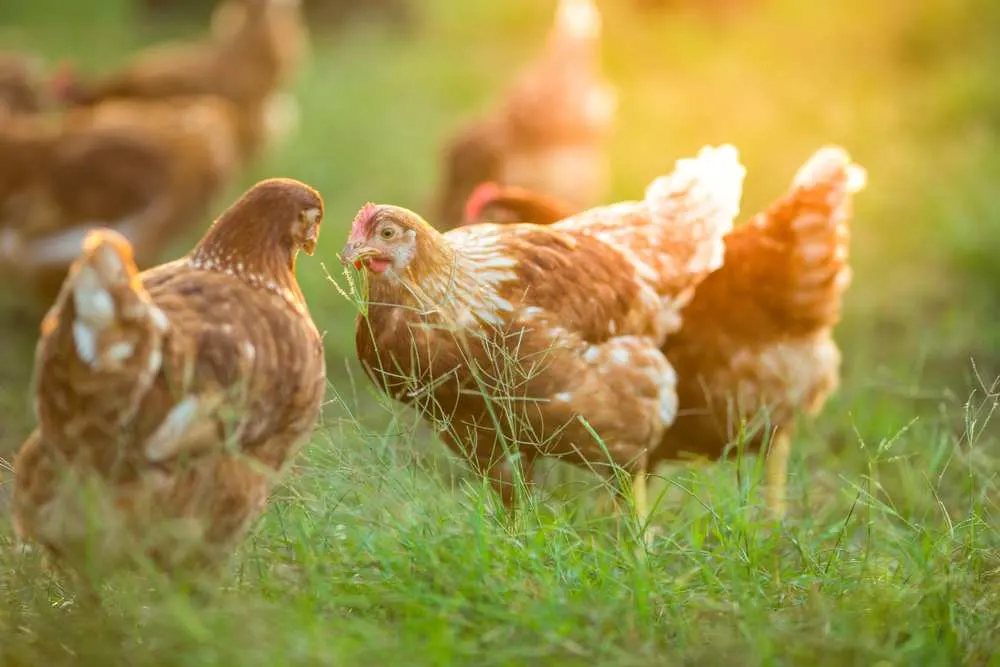
Prepared Shrimps As Treats
So, we learned that chickens can safely consume shrimps. However, does that refer to all of the ways shrimps can be prepared? Unfortunately, no. It’s good to know what kind of shrimp dish is okay to give to your chicken!
Raw Shrimps
Chickens will happily swallow a whole, raw shrimp! Raw shrimps are beneficial and safe for them. However, watch out for spoilage. It takes only 4 hours at room temperature for a shrimp to get spoiled. When the temperature is higher, it takes much less time.
Just like humans, chickens can get very sick when eating spoiled seafood. Shrimps that have an ammonia-like odor have probably gone bad. To avoid any visits to the vet, remove the uneaten portions from the coop and throw the shrimp parts away.
Dried Shrimps
Dried shrimps and other seafood are a popular treat for chickens! These are great for your chicken’s egg production and its overall health. Dried shrimps are even better for younger hens because they can easily break them down.
Important note: Watch out for seasonings. Salty, dried shrimps, can harm your chicken. These feathery animals are prone to salt poisoning. Avoid the salty versions and stick to the plain ones.
Fried and Cooked Shrimps
Chickens can eat cooked or fried shrimp only if there’s no seasoning. Bay seasoning, garlic, and salt can harm your flock.
Although fried and cooked shrimps aren’t healthy, they’re not toxic either. Small amounts of fried or buttered shrimp aren’t going to harm your chickens. However, if fed regularly, it can lead to obesity or other health-related issues.
Obesity in chickens can cause numerous problems. Besides multiple yolk eggs and decreased fertility, overweight chicks can suffer from the fatty liver syndrome. This syndrome causes the liver to get filled with fat, which can be fatal.
Chickens can even die while laying eggs with this syndrome. The pressure made during egg-laying can cause the obese chick’s liver to shatter, which can lead to internal bleeding, and lastly – death.
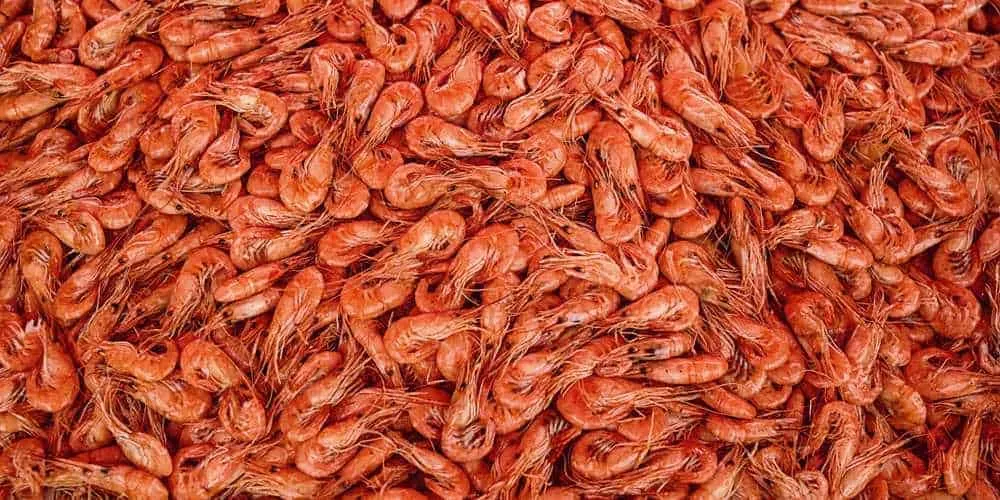
Final Words
We’ve reached the end! To conclude:
Chickens can safely enjoy shrimps. Not only is it safe for them, it even has some health benefits. That goes for the shells and tails, too! Generally speaking, seafood can be an excellent treat for your chickens.
However, keep in mind the 90/10 rule. Shrimp should never be the central part of a chicken’s diet! It’s only a treat, and treats shouldn’t exceed more than 10 percent of their regular daily meals.
When giving shrimps to your feathery friends, watch out for salt or other seasonings that can harm them. Although a little bit of seasoning wouldn’t be fatal for them, you shouldn’t risk it. Your chick’s well-being should be the number one priority!

